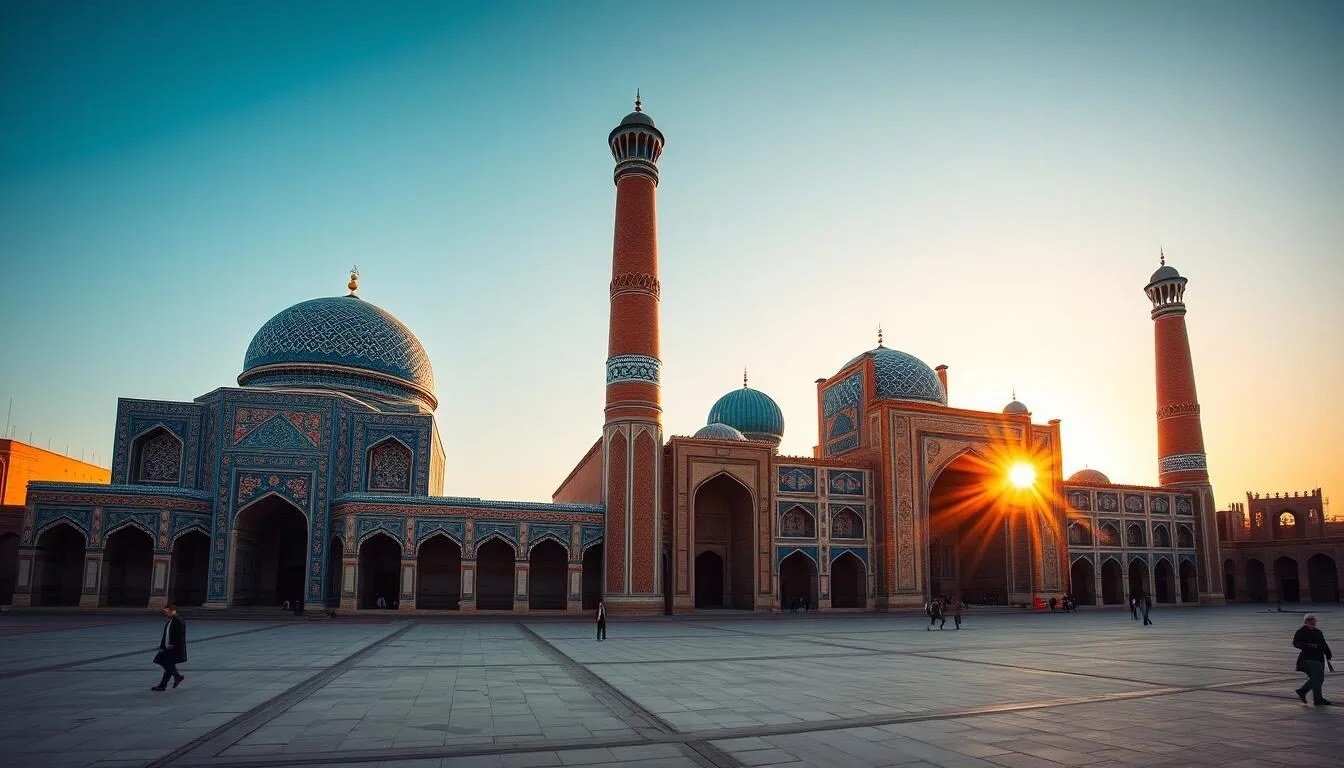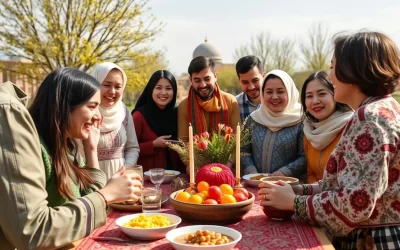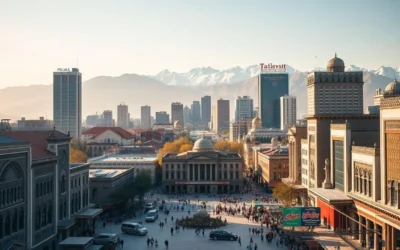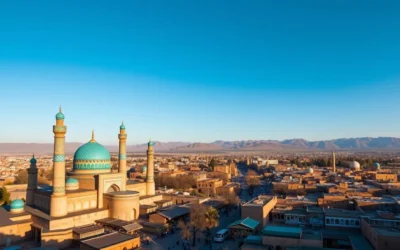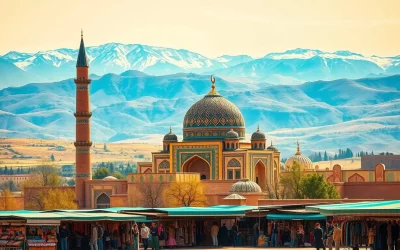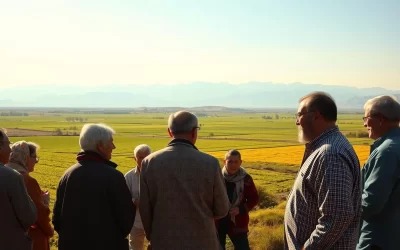✓ Accommodations✓ Flights✓ Rental Cars✓ Tours & Activities
Did you know that Uzbekistan boasts over 4,000 historic monuments along the ancient Silk Road, with some dating back more than 2,500 years? This Central Asian gem remains one of the world’s most architecturally rich yet underexplored destinations. From the breathtaking blue-domed mosques of Samarkand to the living museum of Khiva’s walled inner city, Uzbekistan offers travelers an authentic journey through the crossroads of ancient civilizations.
Plan Your Uzbekistan Adventure
Ready to explore this Silk Road treasure? Start planning your unforgettable journey with these trusted travel resources:
Rent a Car
Discover Activities
1. Marvel at Registan Square in Samarkand
Registan Square – the crown jewel of Samarkand and one of Uzbekistan’s most iconic landmarks
Registan Square stands as the crown jewel of Samarkand and arguably Central Asia’s most spectacular architectural ensemble. This UNESCO World Heritage site features three grand madrasahs (Islamic schools) facing a central plaza: Ulugh Beg Madrasah (15th century), Sher-Dor Madrasah, and Tilya-Kori Madrasah (both from the 17th century).
The intricate blue tile work, massive portals, and soaring minarets create an awe-inspiring panorama that has captivated travelers for centuries. Don’t miss the chance to visit at different times of day – the morning light brings out the vivid colors of the tiles, while evening illumination creates a magical atmosphere.
For the best experience, climb the minaret of Ulugh Beg Madrasah for panoramic views, though be prepared for narrow, dimly lit stairs. Inside Tilya-Kori, you’ll find a stunning mosque with a ceiling adorned with gold leaf that will leave you speechless.
2. Explore the Living Museum of Itchan Kala in Khiva
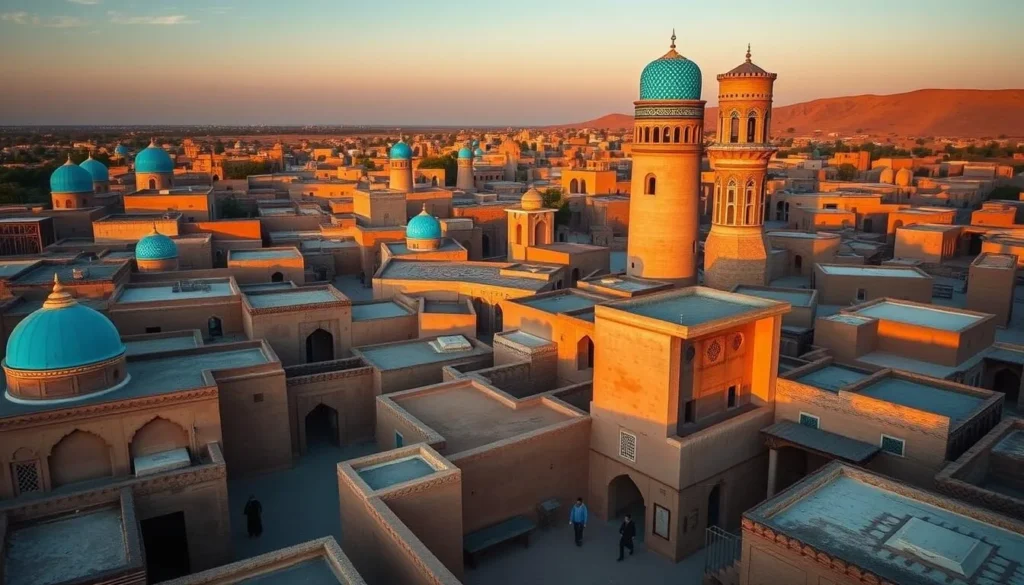
Step back in time in Khiva’s inner city, Itchan Kala – a perfectly preserved medieval urban landscape surrounded by massive clay walls. This UNESCO-protected open-air museum contains dozens of historic monuments within a compact area that’s easily explored on foot.
The unfinished Kalta Minor Minaret is impossible to miss with its dazzling turquoise tiles. Legend says it was intended to be tall enough for the ruler to see all the way to Bukhara, but construction halted after his death. Other highlights include the intricately carved wooden pillars of Juma Mosque, the Tash-Khauli Palace with its elaborate harem quarters, and the Kuhna Ark fortress.
For an unforgettable experience, time your visit for sunset when the evening light bathes the ancient structures in a golden glow. Climb the Islam Khoja Minaret (Uzbekistan’s tallest) early in the morning to avoid crowds and enjoy spectacular views across the city.
Experience Khiva with Local Experts
Discover the hidden stories and architectural wonders of this ancient Silk Road city with knowledgeable guides.
Book a Khiva Tour
3. Wander Through Historic Bukhara
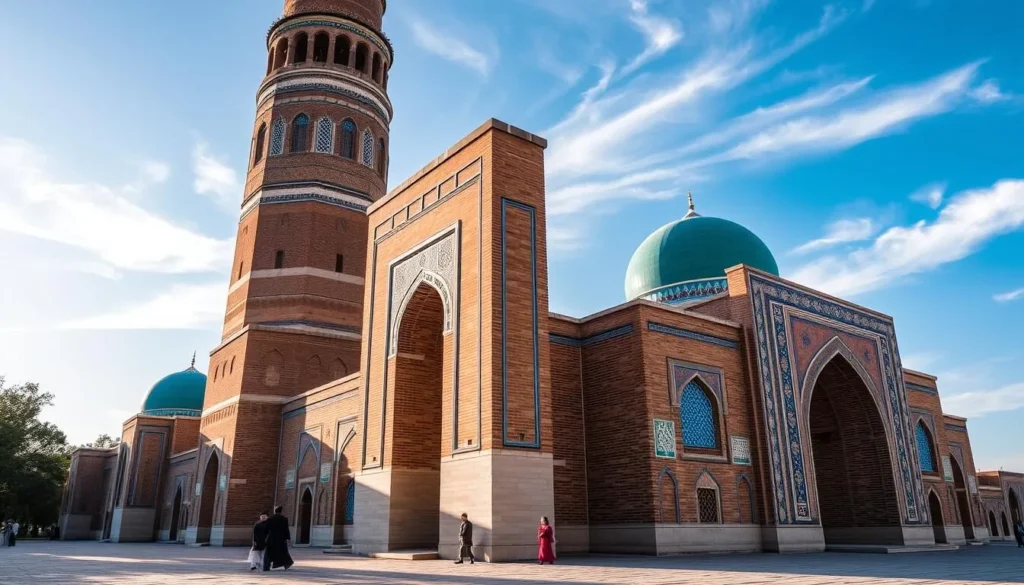
Bukhara offers the most complete example of a medieval city in Central Asia, with an urban fabric that has remained largely intact. Once a major intellectual center and crucial Silk Road trading post, today’s Bukhara preserves over 140 protected historic structures spanning a thousand years of history.
The Po-i-Kalyan complex forms the city’s spiritual heart, featuring the 12th-century Kalyan Minaret that so impressed Genghis Khan he ordered it spared while destroying much of the city. Nearby, the massive Ark fortress dates back to the 5th century and served as the residence of Bukhara’s emirs until the 20th century.
Don’t miss the peaceful Lyab-i-Hauz plaza, centered around a 17th-century pool and surrounded by historic buildings including the Nadir Divan-Begi Madrasah. For a less-visited gem, seek out the charming Chor Minor with its four distinctive turquoise domes, or visit the Samanid Mausoleum, a masterpiece of early Islamic architecture.
The best time to experience Bukhara is at sunrise when the ancient city awakens and the light is perfect for photography. In the evening, enjoy dinner at a rooftop restaurant overlooking the illuminated Kalyan Minaret.
4. Discover the Contrasts of Tashkent
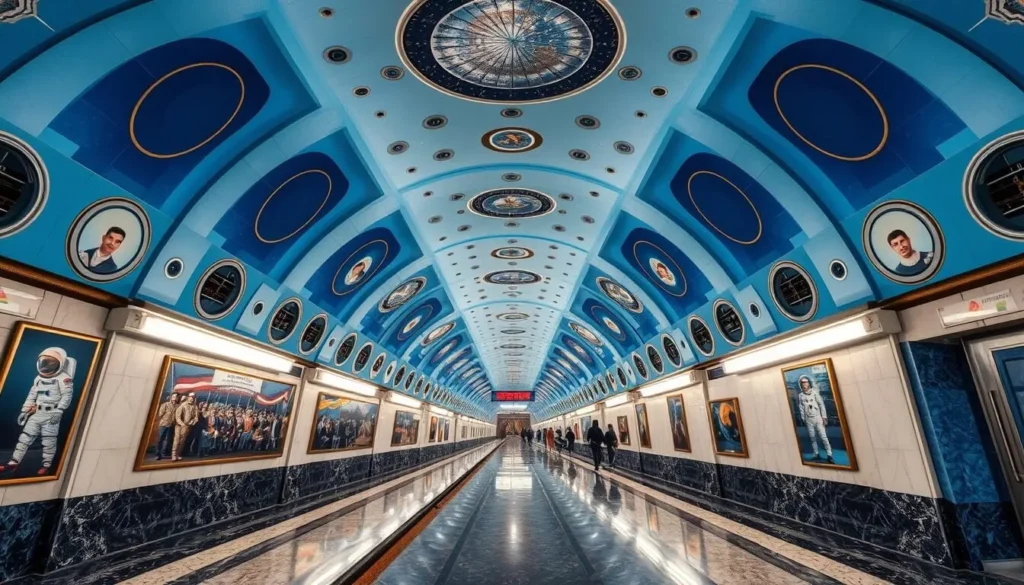
Uzbekistan’s capital might not have the ancient splendor of Samarkand or Bukhara, but Tashkent offers a fascinating blend of Soviet modernism, Islamic heritage, and contemporary Uzbek culture. After a devastating 1966 earthquake, much of the city was rebuilt in grand Soviet style, creating a unique architectural landscape.
Begin your exploration underground in Tashkent’s spectacular metro system. Each station has its own thematic design, with Kosmonavtlar (Cosmonauts) station being the most impressive with its space-themed murals and portraits of Soviet cosmonauts. Until recently, photography was forbidden as the metro doubled as a nuclear bunker.
Above ground, visit the Hazrati Imam complex to see the Uthman Quran, believed to be one of the world’s oldest Quran manuscripts. The massive Chorsu Bazaar offers an authentic glimpse into local life – climb to the upper level of the distinctive blue-domed central building for panoramic views of the market action below.
For a taste of Soviet monumentalism, visit Independence Square with its imposing architecture and the striking Hotel Uzbekistan nearby. The Applied Arts Museum, housed in a traditional mansion, showcases the country’s rich craft traditions from intricate suzani textiles to ceramics.
5. Visit the Shah-i-Zinda Necropolis
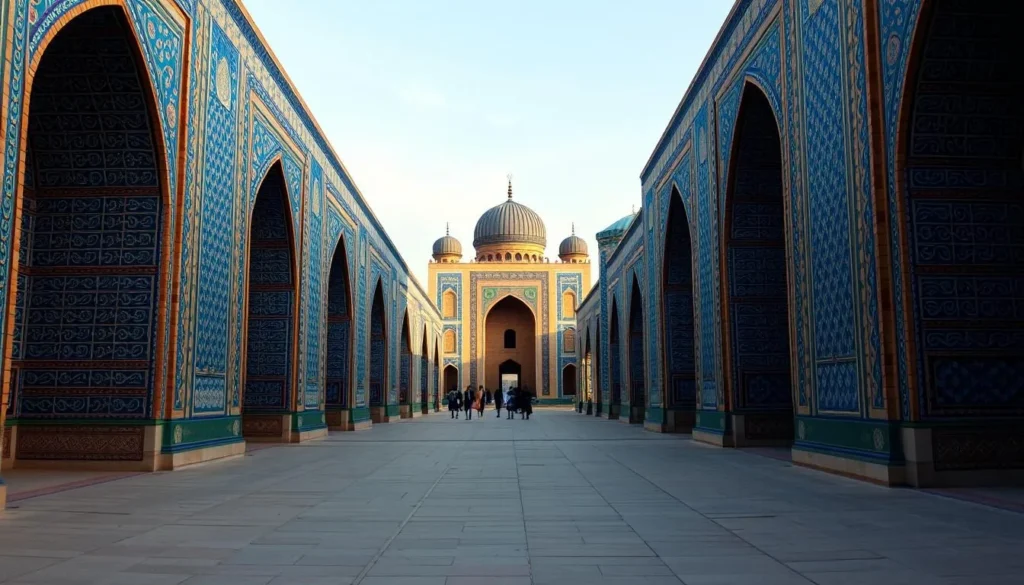
The Shah-i-Zinda (meaning “Living King”) complex in Samarkand contains some of the most exquisite tilework in the Islamic world. This avenue of mausoleums, built between the 11th and 19th centuries, houses the tombs of royal and noble families, including relatives of Timur (Tamerlane).
According to legend, the site is named after Kusam ibn Abbas, a cousin of Prophet Muhammad who is said to have brought Islam to the region. His shrine lies at the end of the complex and remains an important pilgrimage site.
Each mausoleum showcases different periods of artistic development, with the 14th and 15th-century structures featuring the most spectacular ceramic decoration. The intricate geometric patterns, floral designs, and calligraphy represent the pinnacle of Islamic decorative arts.
Visit in the late afternoon when the crowds thin out and the setting sun illuminates the brilliant blue tiles. Take your time exploring the complex, as each mausoleum offers unique architectural and decorative elements worth admiring in detail.
6. Savor Uzbek Cuisine
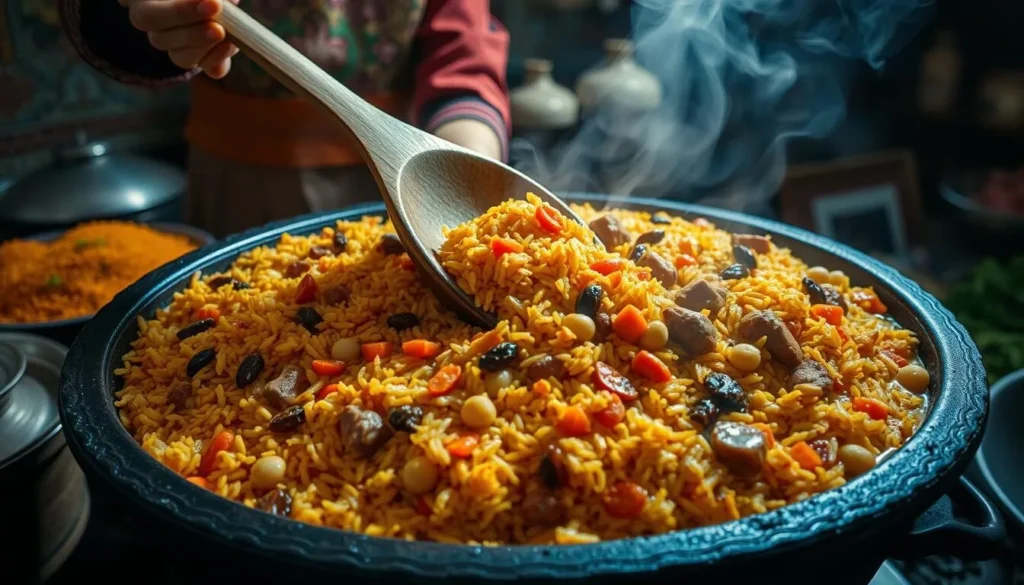
Uzbek cuisine reflects the country’s position at the crossroads of cultures, blending influences from the Middle East, China, Russia, and beyond. No visit is complete without sampling plov (pilaf) – Uzbekistan’s national dish consisting of rice cooked with carrots, onions, and meat, often garnished with chickpeas, raisins, and quince.
Each region has its own plov variation, with Tashkent’s version being particularly renowned. For an authentic experience, visit the Central Asian Plov Center in Tashkent, where massive kazans (traditional cooking pots) produce enough plov to feed hundreds daily.
Other must-try dishes include savory samsa (baked pastries filled with meat or pumpkin), shashlik (grilled meat skewers), lagman (hand-pulled noodles in broth), and manti (steamed dumplings). Vegetarians can find options like achichuk (tomato and onion salad) and non (freshly baked flatbread) available everywhere.
Tea culture is central to Uzbek hospitality – you’ll be offered green tea (kok choy) throughout your journey. Enjoy it at a traditional chaikhana (tea house), where you can relax on a tapchan (raised seating platform) while watching local life unfold.
7. Discover Traditional Crafts
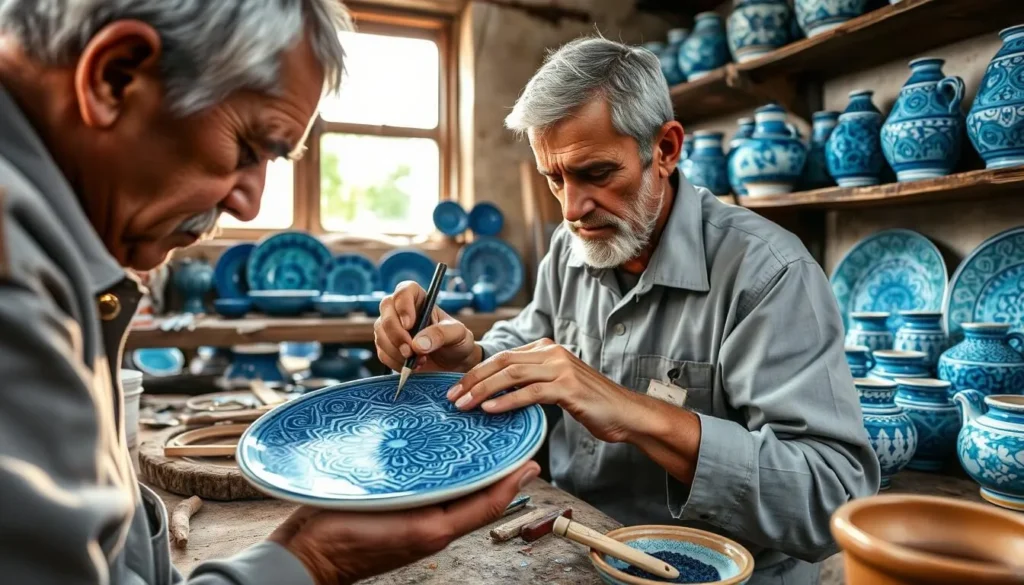
Uzbekistan’s craft traditions have been passed down through generations, with each region specializing in different arts. The Fergana Valley is known for its silk production – visit the Yodgorlik Silk Factory in Margilan to witness the entire process from silkworm to finished ikat textiles using techniques unchanged for centuries.
Rishton and Gijduvan are famous for their ceramics, characterized by vibrant blue and turquoise glazes. Many workshops welcome visitors to observe master potters at work and purchase directly from the artisans. In Bukhara, seek out the traditional Jewish quarter where you can find suzani embroidery and gold embroidery workshops.
Khiva is renowned for its woodcarving tradition, evident in the intricately carved doors and columns throughout the old city. The Khiva Carpentry Museum showcases this craft, while local workshops offer demonstrations of traditional techniques.
For quality souvenirs, look for the UNESCO seal that certifies authentic handmade crafts. The best places to shop are directly from artisans’ workshops rather than tourist markets, though Bukhara’s covered bazaars offer a good selection of crafts from across the country.
Experience Uzbekistan’s Rich Cultural Heritage
Discover traditional crafts, ancient architecture, and local customs with expert-guided cultural tours.
Browse Cultural Experiences
8. Explore Vibrant Bazaars
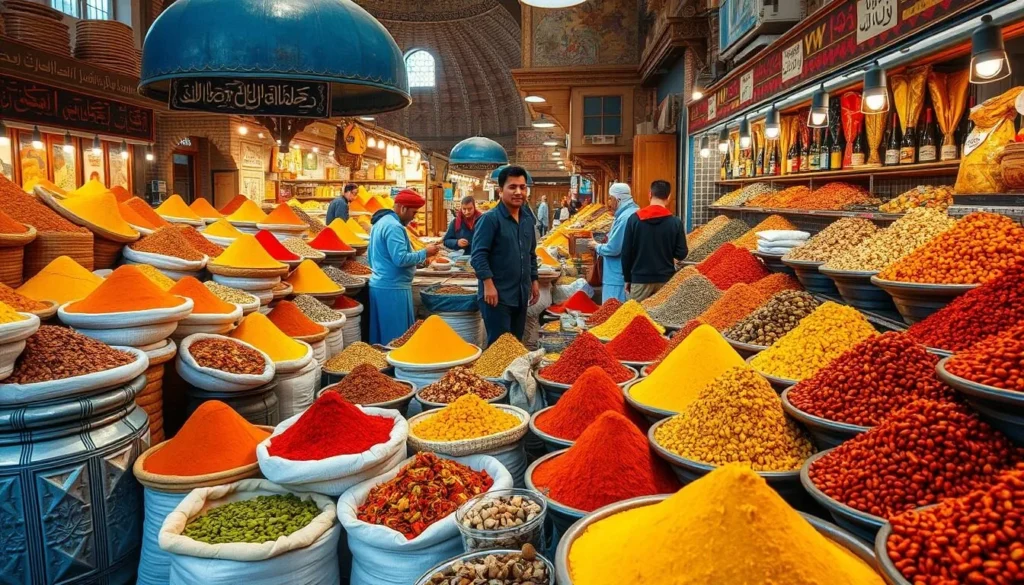
Uzbekistan’s bazaars have been centers of commerce and social life for centuries, and they remain the best places to experience authentic local culture. Tashkent’s Chorsu Bazaar is the country’s largest, housed under a massive blue dome. Here you’ll find everything from mountains of spices and dried fruits to traditional clothing and everyday household items.
In Samarkand, visit the Siab Bazaar near the Bibi-Khanym Mosque, famous for its fresh produce and Samarkand’s special non bread, decorated with distinctive patterns. Bukhara’s trading domes once specialized in different goods – today, the Toki-Sarrafon (money changers’ dome) and others house souvenir shops, but their historic architecture remains impressive.
For a less touristy experience, seek out neighborhood bazaars where locals shop. Early mornings offer the freshest produce and most authentic atmosphere before the tourist crowds arrive. Don’t miss trying seasonal fruits – Uzbekistan’s melons and grapes are particularly renowned for their sweetness.
While bargaining is expected at souvenir stalls, it’s less common for food items. Approach haggling as a friendly conversation rather than a competition, and remember to smile – Uzbeks appreciate good humor in business dealings.
9. Explore Ancient Desert Fortresses
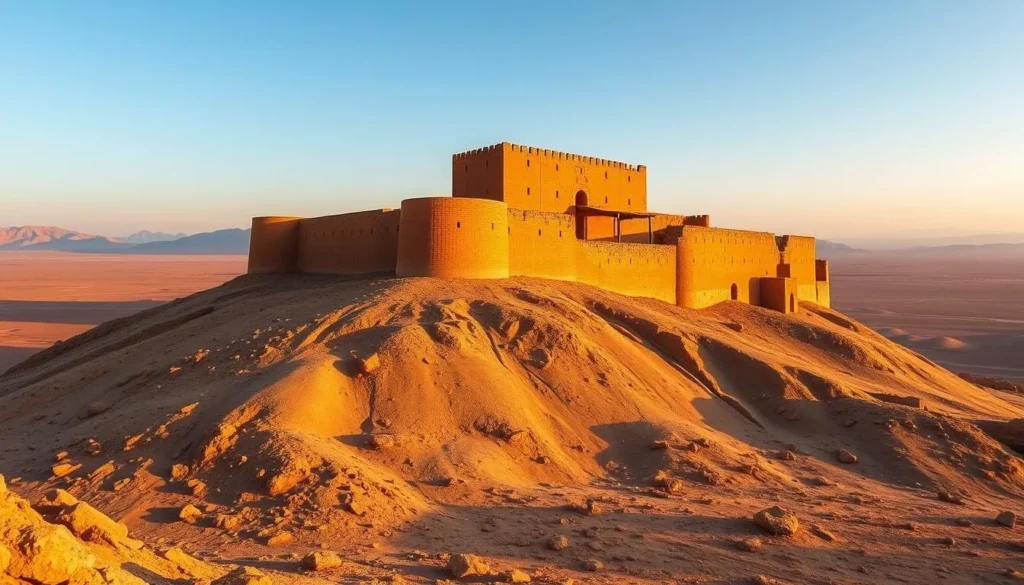
For an off-the-beaten-path adventure, venture into Karakalpakstan in northwestern Uzbekistan to discover the ancient desert fortresses known as qalas. These clay structures once protected oasis settlements along the Amu Darya river and date back over 2,000 years.
Ayaz-Kala is perhaps the most impressive, consisting of three fortresses built between the 4th century BCE and 7th century CE. Perched on a hill overlooking the desert, its massive walls offer spectacular views across the Kyzylkum Desert. Nearby, Toprak-Kala was once a royal city with a palace containing over 150 rooms.
These remote sites receive few visitors, allowing for a more contemplative experience of Uzbekistan’s ancient history. The stark desert landscapes surrounding the fortresses create dramatic photo opportunities, especially in the golden light of early morning or late afternoon.
While it’s possible to visit as a day trip from Khiva, consider staying overnight in a yurt camp near Ayaz-Kala for a truly memorable experience. The clear desert skies offer spectacular stargazing opportunities far from city lights.
10. Practical Information for Visiting Uzbekistan

Best Time to Visit
Uzbekistan has a continental climate with extreme temperature variations. The ideal times to visit are spring (April-May) and autumn (September-October) when temperatures are pleasant. Summer (June-August) brings intense heat, particularly in desert areas, while winter (November-March) can be bitterly cold.
Getting Around
The high-speed Afrosiyob train connects Tashkent, Samarkand, and Bukhara, offering a comfortable and efficient way to travel between major cities. Regular trains serve other destinations, including overnight services to Khiva (Urgench station). Shared taxis and minibuses (marshrutkas) connect cities and towns for more flexible travel.
Visa Information
Uzbekistan has significantly simplified its visa policy in recent years. Citizens of many countries, including the US, Canada, EU nations, and Australia, can enter visa-free for 30 days. Check the latest requirements before traveling as policies may change.
Money Matters
The Uzbek som (UZS) is the local currency. ATMs are widely available in major cities, though it’s advisable to carry some cash when traveling to remote areas. Credit cards are accepted at upscale hotels and restaurants but less commonly elsewhere.
Language
Uzbek is the official language, with Russian widely spoken, especially in urban areas. English proficiency is growing but limited outside the tourism industry. Learning a few basic Uzbek phrases will be greatly appreciated by locals.
Where to Stay
Uzbekistan offers accommodation options ranging from international luxury hotels to charming boutique properties in historic buildings. For an authentic experience, consider staying in a traditional guesthouse or B&B.
In Samarkand and Bukhara, several boutique hotels occupy restored merchant houses within the historic districts, offering traditional architecture with modern comforts.
Suggested Itinerary
For a comprehensive experience, allow at least 7-10 days to explore Uzbekistan’s highlights:
- Days 1-2: Tashkent
- Days 3-4: Samarkand
- Days 5-6: Bukhara
- Days 7-8: Khiva
- Days 9-10: Desert fortresses or Fergana Valley
Uzbekistan Map
Map of Uzbekistan showing major cities and attractions
Ready to Experience Uzbekistan?
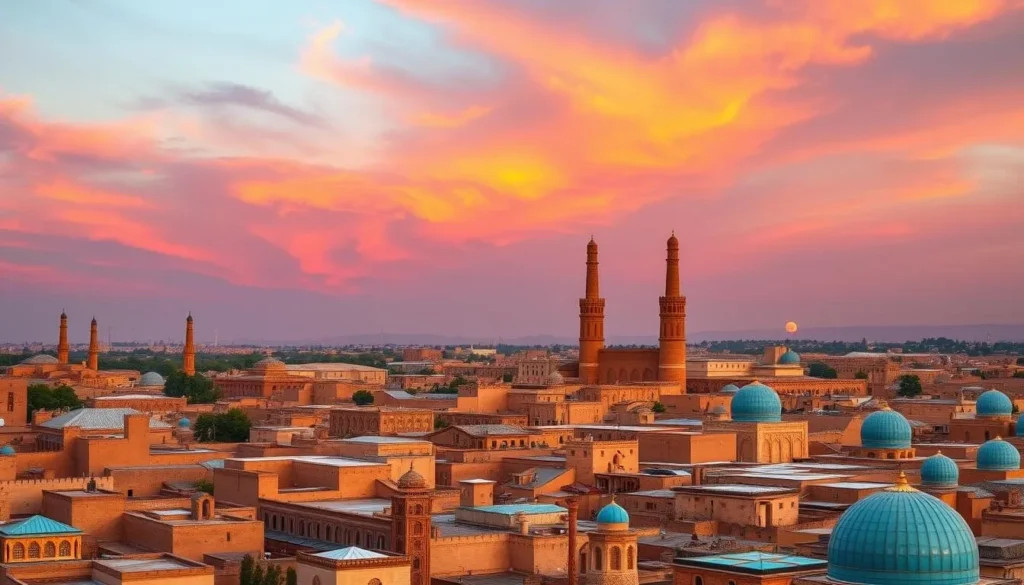
Uzbekistan offers travelers a rare glimpse into the crossroads of civilizations, where ancient traditions thrive alongside modern developments. From the magnificent blue-domed monuments of Samarkand to the living museum of Khiva and the vibrant bazaars of Tashkent, this Central Asian gem rewards visitors with unforgettable experiences and warm hospitality.
Whether you’re marveling at intricate Islamic architecture, sampling delicious plov, or shopping for handcrafted souvenirs in historic trading domes, Uzbekistan’s rich cultural heritage and stunning landscapes create a journey unlike any other. As you walk in the footsteps of ancient Silk Road traders, you’ll discover a destination that remains authentic and welcoming to modern explorers.
Begin Your Uzbekistan Adventure Today
This ancient Silk Road nation awaits with its architectural treasures, rich culture, and legendary hospitality.
The above is subject to change.
Check back often to TRAVEL.COM for the latest travel tips and deals.
